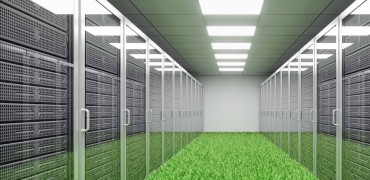The UK government has cemented AI firmly in place as a cornerstone of national growth for at least the next five years.
My last blog highlighted the government’s focus on data centres as ‘critical infrastructure’ that would be prioritised in planning.
More recently, the UK Department for Science, Innovation and Technology announced a commitment to establishing five quantum hubs across the UK with £100 million in funding.
Which is to say that the UK’s data centre sector is firmly on the path to rapid growth. But that opportunity also presents a challenge – massively increasing energy use.
The UK’s switch to renewables depends on energy efficiency – not increased consumption
Six times more energy
In June 2024, the BBC reported that National Grid chief executive John Pettigrew said that the UK boom in AI and quantum computing would increase data centre energy use “six-fold in the next decade.”
The problem is that while data centres are accelerating the UK’s leap into the AI and quantum future, they’re a potential millstone around its Net Zero 2050 carbon emission goals. The UK’s switch to renewable electricity generation such as wind, solar and nuclear depends on energy efficiency across all sectors – not increasing consumption.
The data centre sector is very aware of its environmental responsibility and developers are already exploring how they can drive efficiencies with technology that provides more computing power on less energy. For instance, modern servers can run at higher temperatures than their predecessors, allowing data centres to make more use of free cooling.
And it’s cooling that continues to be a key focus for data centre designers and operators. RICS estimates that around 40% of a data centre’s electricity use is for cooling, so technologies that can optimise efficiencies here are critical for success.
As a result, data centre cooling systems have seen significant developments such as liquid cooling and advanced monitoring to focus on reducing the energy they use. However, the growth of AI will continue to increase energy consumption.
IT as a heat source
One approach to addressing the environmental aspects of data centre development, is to consider them a source of heat energy. Mitsubishi Electric’s recently published guide, Data centres: Heat reuse for a low carbon future examines how heat ejected from data centre cooling systems can be re-applied in local heat networks.
Mitsubishi Electric has been extensively involved in heat reuse projects around Europe including Norway and Ireland, where our heat pump technology has been successfully used to deliver low-carbon heating to homes and businesses.
It's an approach that sits well with the UK’s drive to decarbonise heating alongside its updated commitment to extend the use of heat networks around the UK.
For example, at the end of 2023, the government announced that Old Oak Park Royal Development Corporation would receive £36 million to construct a heat network using waste heat from data centres to provide heating to over 10,000 homes and 250,000m2 of commercial space.
Know-how and experience
The UK’s rapid data centre growth must work alongside the government’s renewed commitment to its Net Zero targets and increased use of renewable generation. Our path to technology-driven innovation and growth lies between these two challenges.
The most effective approach to navigating these issues is applying the most appropriate technology for each project.
Mitsubishi Electric’s data centre team has the know-how and experience to help clients get to grips with the carbon and energy challenge, to deliver data centres that provide robust operation with optimised energy efficiency – and the potential to help the UK to its low-carbon heat future.
Read our Guide to find out more or get in touch to find out how Mitsubishi Electric can help with our products, service and advice.
Shahid Rahman is EMEA Data Centre Strategic Account Lead




